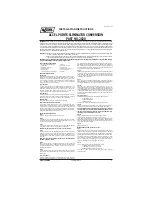
In addition, the children could also set the
vehicle in motion, for example by:
R
releasing the parking brake.
R
changing the transmission position.
R
starting the vehicle.
#
Never leave children unattended in the
vehicle.
#
When leaving the vehicle, always take the
SmartKey with you and lock the vehicle.
#
Keep the vehicle SmartKey out of reach
of children.
If the vehicle does not start and the display mes-
sage
Place Key in Marked Space See Operator's
Manual
appears in the multifunction display, you
can start the vehicle in emergency operation
mode.
#
Remove key
1
from your key ring.
#
Insert key
1
into the slot.
The vehicle is started a er a brief time.
#
Leave the key inserted during the entire jour-
ney.
If you pull key
1
out of the slot, the engine
continues to run.
#
Have key
1
checked at a quali ed specialist
workshop.
If t
If the v
he vehicle does no
ehicle does not st
t start:
art:
#
Leave key
1
in the marked space.
#
Depress the brake pedal.
#
Start the vehicle with the start/stop button.
%
You can also switch on the power supply or
the ignition with the start/stop button.
Br
Breaking-in not
eaking-in notes
es
Protect the engine during the rst 1,000 miles
(1,500 km) by:
R
Driving at varying road and engine speeds.
R
Shi ing to the next highest gear at the very lat-
est when the needle reaches the last third
before the red area in the tachometer.
R
Avoiding stress on the vehicle such as driving
at full throttle.
R
Not shi ing manually to a lower gear to brake.
R
A er 1,000 miles (1,500 km), gradually
increasing the engine speed and accelerating
the vehicle up to full speed.
R
VVehicles wit
ehicles with aut
h automatic tr
omatic transmission:
ansmission: not
depressing the accelerator pedal beyond the
pressure point (kickdown).
This also applies if the engine or parts of the drive-
train have been replaced.
Also observe the following breaking-in notes:
R
A er the vehicle has been delivered or a er
repairs, the sensor system of the ESP
®
driving
safety system adjusts itself automatically a er
the vehicle has been driven a certain distance.
Full system e ectiveness is not reached until
the end of this teach-in process.
R
New and replaced brakepads, brake discs and
tires only reach their optimal braking e ect
and traction a er approximately 100 miles.
Until then, compensate for the reduced brak-
ing e ect by applying greater pressure to the
brake pedal.
Dr
Driving tips
iving tips
NNoottes on dr
es on driving
iving
&
W
WARNING
ARNING Risk of accident due to objects
in the driver's footwell
Objects in the driver's footwell may impede
pedal travel or block a depressed pedal.
This jeopardizes the operating and road safety
of the vehicle.
#
Stow all objects securely in the vehicle
so that they do not get into the driver's
footwell.
#
When using oor mats or carpets, make
sure that they are properly secured so
that they do not slip or obstruct the ped-
als.
Driving and parking 107
107
















































